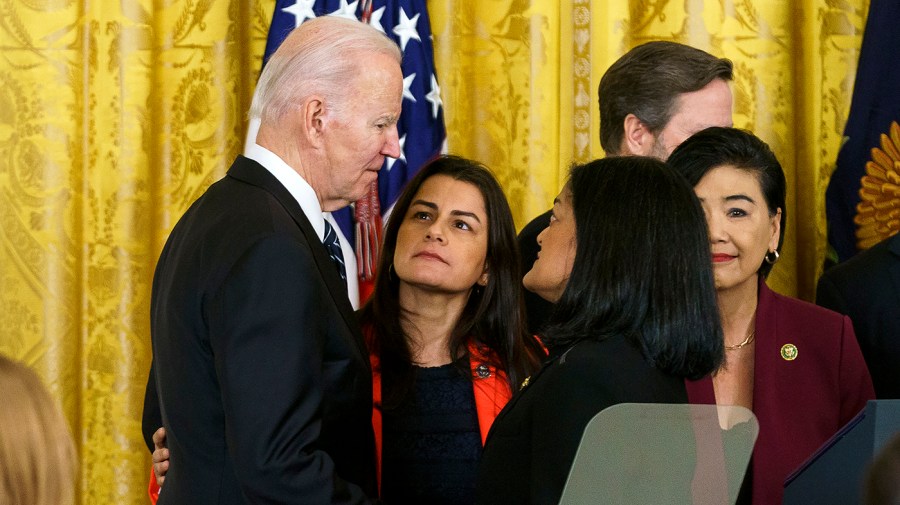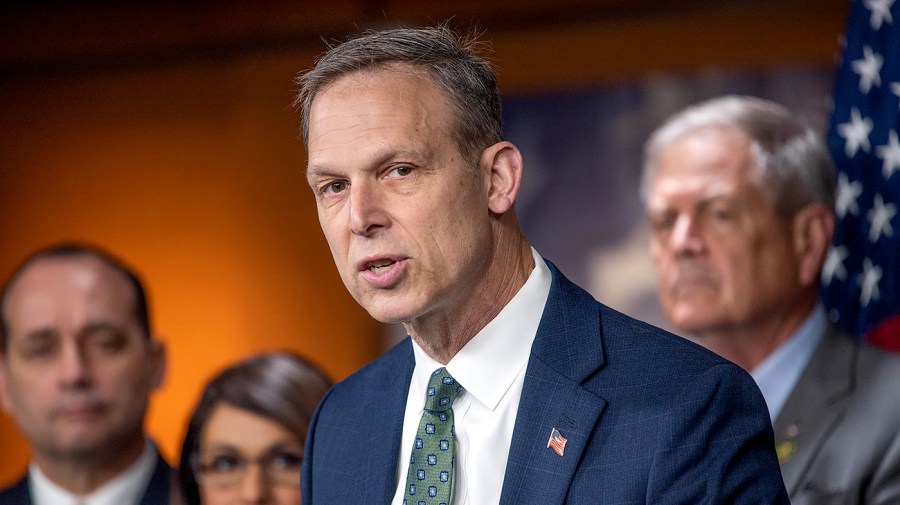66 progressive lawmakers urge Biden to use 14th Amendment in debt ceiling fight

Dozens of progressives have signed onto a letter urging President Biden to invoke the 14th Amendment and bypass Republicans to prevent the nation from defaulting on its debt.
Congressional Progressive Caucus (CPC) leaders Pramila Jayapal (D-Wash.), Ilhan Omar (D-Minn.) and Greg Casar (D-Texas) led more than 60 progressives in penning the letter to Biden on Friday, as the president attends the Group of Seven (G-7) summit abroad this week.
“If the options are either agreeing to major cuts to domestic priorities under the Republican threat of destroying the economy and moving forward to honor America’s debts, we join prominent legal scholars, economists, former budget officials, and a former president in advocating for invoking the 14th Amendment of the Constitution,” they wrote.
“Not only does the debt ceiling run counter to the Constitution’s mandate that the validity of America’s public debt shall not be questioned, it contradicts the appropriations law that requires the Treasury to issue debt for the funding you are obligated to administer at Congress’s direction,” the group added.

President Biden speaks with Reps. Nanette Barragan (D-Calif.) and Pramila Jayapal (D-Wash.) following an event to introduce nominee to be Secretary of Labor Julie Su in the East Room of the White House in Washington, D.C., on Wednesday, March 1, 2023. (Greg Nash)
The letter comes as Republican negotiators indicated that bipartisan talks to resolve the nation’s debt limit fight had hit a roadblock on Friday — and blamed the White House.
Speaker Kevin McCarthy (R-Calif.) said the negotiations were on pause, claiming the other side failed to make adequate concessions on spending cuts.
“We’ve got to get movement by the White House, and we don’t have any movement yet. So, yeah, we’ve gotta pause,” McCarthy said.
“Yesterday I really felt we were at the location where I could see the path. The White House is just — look, we can’t be spending more money next year. We have to spend less than we spent the year before. It’s pretty easy.”
More debt ceiling coverage from The Hill:
- Psaki on debt ceiling talks: China probably ‘rooting for default’
- Trump urges hardline position as debt ceiling talks paused: ‘Do not fold!!!’
- McCarthy hits pause on debt ceiling talks
- House Freedom Caucus takes aim at debt ceiling talks
- Democrats warn Biden against cutting debt ceiling deal with McCarthy
It also came a day after the House Freedom Caucus pushed the Senate to pass the GOP conference’s partisan debt limit package, with the group calling for “no further discussion” until it makes it out of Congress.
The statement from the hardline conservative caucus was thought to pose a threat to the GOP conference’s unity amid bipartisan debt limit negotiations between the White House and Republican leaders.
But House Freedom Caucus Chairman Scott Perry (R-Pa.) seemed to try to dial back some of the heat later on Thursday, telling CBS: “We’re not saying you can’t continue to talk, but until they’re willing to tell us what they’re willing to do, it’s hard to come to an agreement.”
Liberals and conservatives alike have been raising concerns over how far leaders on both sides will go to strike a bipartisan deal to prevent a federal default.

Rep. Scott Perry (R-Pa.) addresses reporters during a press conference on Friday, March 10, 2023 with members of the House Freedom Caucus to discuss the debt limit. (Annabelle Gordon)
In their letter to Biden on Friday, progressives accused Republicans of “economic ransom,” while pressing the president against concessions that could lead to “devastating budget cuts, additional work requirements for essential food and economic support, and fast-tracking fossil fuel projects that undermine our shared climate achievements is antithetical to our shared Democratic values.”
They went on to argue that Biden should invoke the 14th Amendment, which says “the validity of the public debt of the United States … shall not be questioned,” to try to continue to issue debt to make federal payments.
But there are serious questions about the legality of such a move. And the stakes are high, as experts warn the nation’s economy could face catastrophic consequences if lawmakers fail to act quickly on the debt limit.
Meanwhile, conservatives are stepping up pressure for both sides to produce a deal that would enact new limits on annual government funding, permitting reform and changes to work requirements or federal assistance programs, among other proposals.
Less than two weeks stands between Congress and the June 1 deadline forecasted by the Treasury Department as the earliest the nation risks federal default.
Copyright 2023 Nexstar Media Inc. All rights reserved. This material may not be published, broadcast, rewritten, or redistributed. Regular the hill posts








